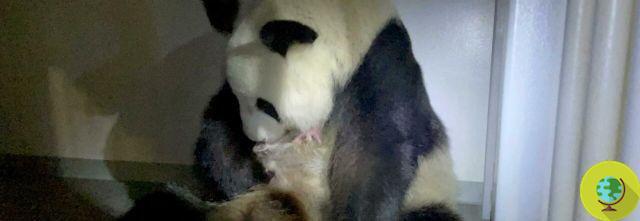
A life cut short in the bud. The baby panda who died today in the Tokyo zoo was just six days old, which leads us to deal with the progressive loss of biodiversity on our planet. But are we really sure that zoos are the right solution?
He is about to end up run over, his mother saves him
Tokyo - A life cut short in the bud. He just had six days the little one of panda died today in zoo in Tokyo. He was lying on his back on his mom's belly Shin Shin, so much so that he seemed to be asleep instead his heart had stopped beating and the rescues were useless.
The puppy, who had a weighing just over 100 grams, he died probably due to a pneumonia. She didn't have a name yet, but in Japan he was already a celebrity, especially since it was the first panda born in Ueno for 24 years, as well as the first ever born from a natural coupling, after three puppies were born with artificial insemination in 1988. It was il site of the zoo , with the Japanese media ready to act as a sounding board, so much so that, for example, the public tv Nhk he interrupted the regular programming for a speciqal edition of the news.
Born in Japan, the baby panda actually had Chinese origins: his parents actually come from China, even if they have now been loaned to the zoo by the Beijing government since February 2011, for a annual cost of about 800 thousand euros. The pair of pandas had even become a cause of clash between the two Asian countries, after the nationalist governor of Tokyo, Shintaro Ishihara, had proposed to call the puppy on arrival "Its its" or "Rigid Stiff“, With a clear reference to Senkaku islands, administered by Japan and claimed by China.
Beyond the political events, the death of this panda cub leads us to deal with the increasingly progressive loss of biodiversity of our planet. But we are really sure that zoos are the right solution? Absolutely opposed to this type of detention, even if for scientific purposes, is the Lav, he believes immoral to deprive every living being of freedom e any study conducted on animals forced into inevitably confined spaces is unscientific.
“It is estimated that approx 6.000 animal species are in danger of extinction, yet only a few of them are included in captive breeding programs, and only about twenty have been successfully reintroduced into the wild. Gods about 10.000 zoos in the world fewer than 500 register their animals in international databases. It is estimated that in zoos sonly 5-10% of the exhibition space and resources are dedicated to animals at risk of extinction“, Oltrelaspecie then writes on his website.
The anti-species association, in addition to dismantling point by point the alleged "educational" purpose of these structures, where wild animals are subject to imprisonment and humiliation to be considered gods fun objects, lashes out against the claim of zoos to preserve some species of animals in danger of extinction by making them reproduce in captivity.
“The facts show that ganimals, deprived of natural selection, lose their genetic variability with the consequent weakening of the species. Furthermore, i reintroduction programs of wild animals in their native environment often fail because animals kept in captivity no longer have the ability to adapt and survive ”, explains Oltrelaspecie. Here because animals must be protected in their natural environment and not locked up forever in an artificial habitat. Here's why it is It is important not to visit zoos, safari zoos, aquariums, dolphins and circuses with animals, inviting relatives, friends and acquaintances to do the same.
Roberta Ragni


























